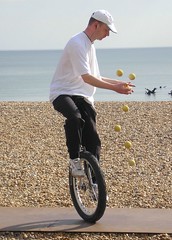 Interesting connection between information overload and multitasking in an article by Derek Dean and Caroline Webb on the McKinsey Quarterly (membership required), with excellent bibliographical coverage from a neurological point of view (see below).
Interesting connection between information overload and multitasking in an article by Derek Dean and Caroline Webb on the McKinsey Quarterly (membership required), with excellent bibliographical coverage from a neurological point of view (see below).
I have actually always considered information overload a matter of choice (what to read, with a limited amount of time in my hands) more than one of efficiency (do not be distracted by communications, in order to dedicate the correct amount of attention to important issues). The reasoning in the article, mainly directed at the latter, affirms that multitasking is the wrong answer as it makes human beings less productive, less creative and less able to make good decisions.
While acknowledging that addressing the problem requires enormous self-discipline, the article also points out how executives’ behavior sets the tone for the whole organization. An always-connected leader would probably suggest with his own behavior that the same is, if not required, at least welcome from the others. I would add that, by extension, those who are regarded as technology experts within the organization might be counted among the ones who set the tone as well: simply because “they know better” (at least, as long as technology is concerned) and therefore provide an equally influent example.
At the end of the day, the Blackberry has created a watershed moment: since its advent, being always connected has ceased to be the birthmark of the inventive, resourceful, bleeding-edge-addict geek. It might be the right time to find (and lead) the way to clever, technology-powered disconnectedness…
Bibliography:
The dark side of information: overload, anxiety and other paradoxes and pathologies
David Bawden, Lyn Robinson
Journal of Information Science April 2009 vol. 35 no. 2 180-191
Isolation of a Central Bottleneck of Information Processing with Time-Resolved fMRI
Paul E. Dux, Jason Ivanoff, Christopher L. Asplund, Rene Marois
Neuron, Volume 52, Issue 6, 21 December 2006
Cognitive control in media multitaskers
Eyal Ophir, Clifford Nass, Anthony D. Wagner
PNAS September 15, 2009 vol. 106 no. 37 15583-15587


